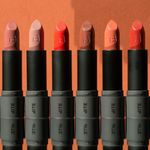
Services
From makeovers to personalized skincare consultations

From makeovers to personalized skincare consultations

Get inspired, play with products & learn new skills

Exciting launches, parties & more

Explore what's hot in your store

Ask questions, join challenges, and get recommendations from people like you

Discover topics tailored to your beauty interests

Add your photos and get inspired by fellow beauty lovers
View activity, savings and benefits
Redeem items, samples and more
View and track online orders
Reorder it from in-store and online purchases
View saved products
Recommendations from your store visits
Manage your services, classes and events
Complete your beauty traits for personalized recommendations
Payments, contact info, addresses and password
View activity, savings and benefits
Redeem items, samples and more
View and track online orders
Reorder it from in-store and online purchases
View saved products
Recommendations from your store visits
Manage your services, classes and events
Complete your beauty traits for personalized recommendations
Payments, contact info, addresses and password

Ask questions, join challenges, and get recommendations from people like you

Discover topics tailored to your beauty interests

Add your photos and get inspired by fellow beauty lovers

From makeovers to personalized skincare consultations

Get inspired, play with products & learn new skills

Exciting launches, parties & more

Explore what's hot in your store
~ Updated Dec 23rd 2020 ~
A place to talk about beauty news... anything that doesn't have a specific thread. For upcoming releases, product updates and brand threads see the links below.
Thanks to everyone who contributes to this thread!
UPCOMING RELEASES
2021 RELEASES THREAD
https://community.sephora.com/t5/Beauty-Confidential/2021-PRODUCT-RELEASES-THREAD/m-p/5692691
FALL-WINTER & HOLIDAY RELEASES
FOUND IN THE WILD THREAD
(links to new products for purchase at Sephora)
https://community.sephora.com/t5/Trending-Now/FOUND-IN-THE-WILD-THREAD/m-p/5157361
CANADIAN PRODUCT THREAD
(links to new products for purchase at Sephora)
https://community.sephora.com/t5/Oh-Canada/What-s-New-On-The-Site-Today-Canada/td-p/2164948
BRAND THREADS
Old Beauty News Thread
@Samtian with your love of their highlighters i figured it would.
@sprocketta Becca is my favorite. I still need so many more from them haha.
Thanks @SportyGirly125 ! Yeah I don’t know why I can’t post a clear picture
Aw man- this one hurts. @beccacosmetics makes my holy grail primer. I'm really going to hate to see them go! 😢
Thank you for the heads up, @Kim888.
I mean, are we surprised?

The Estée Lauder Cos. Inc. has agreed to buy a majority stake in Deciem, the parent company of popular skin care brand The Ordinary, at a $2.2 billion valuation.
Lauder owns a 29 percent stake in Deciem after investing in 2017. Under the terms of the deal, Lauder is paying $1 billion to increase its ownership position to 76 percent, valuing the company at $2.2 billion. In three years, Lauder plans to buy the rest of the company at a to-be-determined valuation.
“It felt like the right time from our people, our brand, our infrastructure. We feel like it’s a time where they can really come in and offer access to different resources that can strengthen where we are today, but we are so strong in our identity and in our culture that it won’t be overtaken by big corporate,” said Deciem chief executive officer Nicola Kilner in an interview.
For 2020, Deciem nearly doubled sales, to about $460 million. The bulk of sales come from The Ordinary, known for affordable skin care products including Niacinimide 10% + Zinc 1%, $5.90, and AHA 30% + BHA 2% Peeling Solution, $7.20.
“Deciem is an exceptional company. Nicola and her team have built and cultivated authentic brands with highly effective, must-have products using a vertically integrated model, and have fostered a uniquely transparent and engaging communication style. The company’s hero products, desirable innovation and digital- and consumer-first high-touch approach have been instrumental to its success,” said Fabrizio Freda, Lauder’s president and CEO, in a statement.
Kilner will report in to Stéphane de la Faverie, group president at Lauder. Several Deciem executives will retain ownership during the next three years.
“The business has got to a really good place where we still have so much of the creativity, and that’s largely because so many of the founding team are still at Deciem today. We’ve been really lucky to retain our people,” Kilner said, noting that Deciem leaders, including herself, chief scientific officer Prudvi Kaka, and chief operating officer Stephen Kaplan would remain in their roles.
Deciem plans to draw on Lauder’s expertise in global expansion to consider entering markets where there is demand, like India and the Middle East, Kilner said. The company also plans to consult with Lauder on regulatory requirements related to those moves, as well as inventory and infrastructure, she said.
“It’s hard to find that balance between a start-up that needs to have the space to flourish and build its own identity and do everything by itself, and then there also comes the point where you become a much bigger brand — it feels like it happens overnight — and you kind of need a bit of help now and again,” Kilner said.
Deciem’s growth for 2020 was driven by expansion with Ulta Beauty and with Sephora online. The company trained store workers to be online consultants, which helped drive up basket size for online orders.
For 2021, Deciem will continue expanding with Ulta and Sephora, including their partnerships with Target and Kohl’s, respectively, and will also expand in Europe with Douglas and Sephora, Kilner said. The business is working to become B Corp. certified.
Oribe is finally launching at Sephora. Product page is up. So excited.
Hope this means the brand makes it way to Sephora shelves soon 🤞🏼🤞🏼
I'm hyped for hyper!
CVC Purchasing Shiseido Personal Care Unit for $1.5 Billion
The Japanese beauty giant aims to be the world’s largest prestige beauty seller by 2030.

To help reach its goal of becoming the world’s premier prestige beauty company by 2030, Shiseido is selling its personal care business to CVC Capital Partners in a $1.5 billion deal.
“The company recognizes that its personal care business, comprising such global brands as Tsubaki and Senka, requires enhanced marketing investment to maximize its potential and foster further growth, and concludes these goals will be best achieved under a new business model,” Shiseido said in a statement.
“Therefore, the company has determined to transfer the business and participate in its operation as a shareholder of the company, which will manage the business after the transfer,” the group said.
Shiseido’s personal care business, valued at 160 billion yen, is to be transferred from the group and its wholly owned subsidiaries. Then a new company will be set up, the shares of which will be shifted to the Oriental Beauty Holding Co. Ltd., which is financed by funds advised by CVC.
A joint venture will be established, and Shiseido is to act as a shareholder of the company that will operate the personal care business after the transfer.
As previously reported, on Jan. 25, Shiseido said it was in discussions with CVC Asia Pacific Ltd. about the transfer of its personal care business, which is primarily operated in Asia.
That activity, with widely known brands also including Uno and Aquair, mostly targets the mass market.
Shiseido has been bulking up its prestige portfolio that includes brands such as Clé de Peau Beauté, Nars and its eponymous Shiseido label.
In fall 2019, the group acquired the Drunk Elephant clean beauty brand for $845 million.
It’s reported other non-core beauty brands of other multinationals are currently in play, including at Unilever, which according to Bloomberg is planning to sell a grouping of assets in the U.S. and Europe. Unilever is said to be working with Credit Suisse Group AG on the spinoff.
In local Toronto beauty news, DECIEM was named by Toronto Public Health as one of three companies with a COVID-19 outbreak that carries "significant risk."
DECIEM told CTV News Toronto they are working closely with TPH to understand why the company has been listed as having an outbreak of the disease. “Once we have this information, we may request for an amendement to the listing, as we believe that the statements made by TPH are misleading,” a statement issued by the company on Tuesday afternoon reads. “We do not believe there to be any current internal spreading of COVID-19 at any DECIEM workplace, nor do we believe that DECIEM poses a significant public health risk.” The statement said the company has declared all positive employee cases to TPH, “which we believe to have been contracted outside of the working environment.” The company said 15 production employees are self-isolating at this time after receiving a positive COVID-19 test result.
I just received a shipment from them, hope the workers are doing okay!!
@pocketvenus - I don't know how big the company is, but 15 seems like a lot of people who tested positive! If it were me, I'd be concerned about the safety procedures in my workplace and if my employees were using them. I would also be concerned if my employees' were taking safety seriously outside of work. I definitely would not be blowing off public health!
@Titian06 The website says it hired its 1,000th employee in 2020. This figure may be pre-pandemic, which I imagine has led to layoffs, and would include workers who are not in the Toronto health region. Still, 15 is a lot for one workplace, especially considering how easily the virus spreads and that spread is exponential. At present, employers with 2+ workers testing positive must report to Toronto Health. Based on a factors designed to protect people's privacy, Toronto Health then decides whether to publicly name the employer.
Thanks for the the explanation, @pocketvenus ! Sounds like DECIEM could be in a bit of trouble.














